- Home
- Kate Davies
The Crims Page 14
The Crims Read online
Page 14
Freddie sat down on the chair next to her. He nodded. “Friday, Freddie, and B-U-T-T-E-R. I’d have to be really stupid not to know how to spell that,” he said.
“I know!” said Imogen. Freddie was a far better liar than she had ever been, she realized—and she had pegged him as the most hopeless Crim of all. She felt a little bit nervous around him now, and slightly betrayed.
“It takes a lot of brains to act this dumb,” Freddie said sadly, pointing to the hole in his sweater, and his mismatched shoes—one hiking boot, one bed slipper. “All I want to do is get up on time, shave, and get dressed in one of my many nice monogrammed shirts. But if I did that, the police would know something was up. So I suffer for my art.”
Imogen shook her head. She still couldn’t get her head around what she was hearing.
Freddie sat down beside her. “I hope you’re not offended that I didn’t tell you the truth,” he said. “I haven’t told anyone in the family about the gambling ring. I know they’d just steal all my money.”
This was true. “But I’m not like the others,” said Imogen.
“Well, there’s that, too,” said Freddie. “You were at that posh school for such a long time, and every time you wrote a letter home, you talked about how well you’d done on your math test without cheating.”
“I got ninety-eight percent on my last one,” Imogen said sadly.
“Exactly,” said Freddie. “No real Crim could get ninety-eight percent on an exam without stealing the questions in advance. So I wasn’t sure I could trust you. But I’ve been watching you, and I’ve seen how hard you’ve been trying to get to the bottom of The Heist . . . and I want to apologize. You were a real Crim all along.” He put his arm around Imogen. “I hope you’re not angry with me,” he said.
“I’m not angry, Freddie,” said Imogen. “I’m a bit shocked, maybe. And annoyed, possibly. And definitely quite creeped out. But also . . . impressed.”
Freddie looked at her. “Impressed?”
“Yes!” said Imogen. “You do realize you’re the only Crim who makes any money off crime?”
“I know.” He nodded bashfully.
“You’re the most successful Crim since Big Nana.”
“I don’t know about that,” Freddie said.
“I do,” Imogen said seriously, scooting around to face him. “And I know something else, too. The Horrible Children are very sweet in their own way”—she ignored Freddie’s skeptical frown—“but they can only get me so far. If we’re going to get our family out of jail, I’ll need someone really cunning and devious. A really talented criminal.” She took a deep breath and said something she never thought she’d say to her eldest cousin: “I need you.”
“STUPID TOURISTS!”
Imogen scowled at the rude, important-looking man who had just insulted her. He was the tenth person to have elbowed her out of the way in as many minutes. She and Freddie were standing on the pavement outside Big Ben, trying to get to the middle of Parliament Square, the grassy area across the street—but there were no traffic lights and no crosswalks, and apparently, the only way to get to the square would be to leap in front of the traffic like an extremely depressed lemming, which Imogen wasn’t. Maybe it shouldn’t have been that surprising that there was no easy way of getting to the square. Most people probably didn’t want to spend their time in one of the world’s greatest cities on a square surrounded by four lanes of traffic.
“I thought you said we could get there from here,” Imogen said.
“That’s what the directions said!” Freddie pulled a printout of an email from his pocket and studied it again.
The email was a reply to the letter that Imogen and Freddie had sent the Kruks, posing as the law firm representing Charm Ltd. Imogen had persuaded Freddie to put his illegal (but successful) gambling ring on the back burner for a few days to help her solve The Heist, and he’d turned out to be a genius at fake letter writing. He had watched so many terrible crime shows on TV while he was pretending to be useless that he knew a lot of useful legal phrases, like “without prejudice” and “our clients” and “suing for damages,” and he wrote to the Kruks saying that Charm Ltd. wanted to hold talks with them about an “appropriate settlement.”
The email had arrived from an anonymous account just a day later, telling Freddie (or Nigel Greystone, as he’d called himself) to come to Kruk headquarters that Tuesday at three p.m. Proceed to the middle of the large square outside Big Ben, and you will be instructed where to go next, the email had said.
It was now Tuesday.
It was three p.m. exactly.
But Imogen and Freddie were still standing on the pavement, staring across the roaring traffic at the square.
“We’re just going to have to run for it,” Freddie said.
“We’ll die!” Imogen said, leaning out of the way as a forklift sped past.
“We might die,” Freddie said, “but the statistical likelihood of dying in a road traffic accident in London in any given year is one in twenty thousand, and the statistical likelihood of our family getting out of prison if we don’t find the lunch box is one in two million, roughly, so—”
“All right, Freddie!” said Imogen, who was still getting used to Freddie’s newfound fondness for quoting facts, which was probably to make up for all the time he’d pretended not to know what a pencil sharpener was. “Let’s do it. Together, on the count of three?”
Freddie nodded.
Before she could change her mind, Imogen reached out for his hand.
The traffic blurred past in front of them.
Imogen took a breath and began to count. “One, two . . . three!”
Freddie burst into the middle of the road first. Imogen darted after him, dodging cars that screeched to a halt just in time, blaring their horns.
But they made it. They slumped to the ground in the middle of the square and sat there, chests heaving, as they tried to catch their breaths.
Imogen looked around for the person who would tell them were to go next. But the square was empty, apart from the two of them, a couple of bushes, and some old drink cans. “Do you think this is a trap?” she asked Freddie. “Do you think the Kruks were assuming we’d die before we got this far?” She’d read too much of Making It Look Like a Very Weird Accident: Killing People Kruk Style not to at least consider the possibility.
But then one of the bushes at the edge of the square waddled up to them and whispered, “Nigel Greystone?”
Imogen would have thought she was hallucinating, except that “Nigel Greystone” isn’t the sort of name you would hallucinate.
“That’s me,” said Freddie, trying to sound gruffer than he really was.
Imogen stared at the bush, which she could see now had a man inside it—she could just make out the outline of his body, but there were too many twigs and leaves in the way for her to see his face. His disguise was so good that a sparrow was roosting on one of his branches.
“Who’s this, then?” said the bush, either talking about Imogen or a pigeon that happened to be strutting past them.
Freddie assumed he meant Imogen. “This is Ginny,” he said. “She’s doing work experience at my law firm. I said she could come to a settlement meeting to see how it works.”
The bush was not happy about this at all. “No way,” he said. “No kids allowed in meetings with the Kruks. She can come inside, but she’ll have to wait in another room.”
“Fine,” said Freddie. “But how do we actually get to this meeting?”
The bush pointed one of his twigs toward a much taller bush at the edge of the square. “You’ve got to get inside that bush over there,” he said.
“Is there a tiny person in that bush too?” asked Freddie.
“I’m not a tiny person,” said the bush. “I’m almost six feet tall when I’m standing up straight.”
“I’m sure you are,” said Imogen.
“And no. There isn’t a person in the bush. Stop asking so many questions and
do as I say.”
Imogen and Freddie walked over to the taller bush and pushed their way through the twigs and leaves to the very center. From inside the bush, the traffic sounded quite far away, and the light was dappled and green. Imogen felt strangely at peace for a moment.
But only for a moment, because then a steel trapdoor opened in the ground next to them, revealing steep metal stairs leading down into blackness. Imogen gasped and took a step back, so she wouldn’t fall in.
“Proceed,” hissed the first bush, who had apparently followed them into the second bush without them noticing.
Imogen’s mouth felt dry. She and Freddie looked at each other. They didn’t really have much choice.
“After you,” said Freddie, gesturing down the stairs.
“After you,” said Imogen.
“No, I insist,” said Freddie.
“If one of you doesn’t walk down those stairs soon, I’ll kick you down,” said the bush.
So Imogen held tight to the banister and reached her foot out for the first step.
The staircase was long and steep and very, very dark. This is fine, Imogen told herself. This is just like Alice in Wonderland, but with a trapdoor instead of a rabbit hole. And we probably won’t find a talking rabbit at the bottom. Except we’ve already met some talking shrubbery, so anything is possible. . . .
When she and Freddie reached the end of the stairs, a door opened in front of them. A stiff-looking butler bowed to them slightly and said, “Welcome to Krukingham Palace.”
He stood aside, and Imogen and Freddie walked into a huge, ornate entrance hall. Imogen felt like she’d been there before, which was strange, as she didn’t spend a lot of time in ornate entrance halls, or indeed, crime family headquarters located in underground bunkers. And then she realized: This hall looked exactly like the entrance hall at Buckingham Palace.
Big Nana had taken Imogen and Delia on a trip to Buckingham Palace the summer before she’d died. They’d watched the Changing of the Guard and stared at the priceless paintings and porcelain vases (while Big Nana examined the security systems), and then Delia had sat on one of the thrones to take a selfie, and they’d been chucked out. But Imogen had never forgotten the feel of the thick red carpets beneath her feet or the way the gold leaf on the walls had gleamed in the sunlight or how lovely the gardens looked when they were full of flowers instead of broken-down cars and failed Halloween costumes.
She’d never forgotten the sweeping golden staircase at the end of the palace entrance hall, either—and there it was now, in front of her. In fact, she realized as the butler led them up the stairs, Krukingham Palace was an exact, full-size replica of Buckingham Palace, just like the rumors said. She had no idea how the Kruks had managed it. Clearly they really were on a different level from the Crims, crime-wise and cleverness-wise and generally-being-successful-wise.
“This way, please,” said the butler, leading Imogen and Freddie down a corridor lined with marble busts. Imogen remembered walking down a similar corridor in the real Buckingham Palace; there, the busts had been of kings and queens and dukes. Here, the marble heads were of men with stubbly faces and gold teeth. Imogen guessed that they were Kruks. She also guessed she wouldn’t have enjoyed running into any of them on a dark night.
The butler stopped abruptly and opened one of the doors that led off the hall. “Your meeting will be in here, sir,” he said to Freddie, and ushered him in. Imogen could see four men with side parts and dark suits and fountain pens sitting at a long table. The oldest-looking man, who had a neat gray beard and a smile that looked uncomfortable, as though he didn’t use it very often, stood up and offered Freddie his hand. “I’m Luka Kruk,” he said in a thick German accent. “Niklas’s son.”
“Nigel Greystone,” Freddie said gruffly.
Imogen was sure she had seen Luka somewhere before too—probably in one of the books about the Kruks she’d read in the library. She held out her hand to him, too, but he just stared back at her, and then the butler cleared his throat.
“If you’d like to accompany me to the sitting room, miss?” he said.
Reluctantly, Imogen followed the butler down the hall to a luxurious sitting room. She sat on a velvet sofa and looked around, admiring the grand piano and the slightly less grand piano and the actually quite ordinary-looking piano.
“Why don’t you do some coloring while you’re waiting?” said the butler, handing her a book and some crayons. “I love it myself. They say it’s very good for relaxation.”
The book he had handed her, however, was the least relaxing coloring book in the history of coloring books. On the front was the Kruk crest and the family motto: “Wir werden Sie zu töten und nehmen Sie Ihr Geld.” Imogen had studied German at school (and she’d been top of the class, of course), so unfortunately, she knew what that meant: “We will kill you and take your money.” Inside the book were black-and-white pictures of the Kruks committing their most impressive crimes.
“That brown crayon’s really good for dried blood,” the butler said helpfully.
“Thanks,” said Imogen, picking it up and reluctantly starting work on the picture of the grizzly bear–shark incident.
“Would you like something to drink?” asked the butler.
“Yes, please,” said Imogen. “What do you have?”
The butler handed her an impressive menu.
It contained every drink that Imogen had ever heard of and lots that she hadn’t heard of before and never wanted to hear of again, including “shark juice” and “small-child cordial.” The last thing on the menu was “Chef’s special smoothie using any ingredients of your choice.”
Imogen had a cunning idea. Her heart started to beat faster—in a good way.
“I’d like a smoothie, please,” she said to the butler.
“No problem, miss,” he said, picking up a notepad to write down her order. “Strawberry and banana?”
“Yes,” said Imogen. “But also kiwi fruit and seven grapes, half a grapefruit, a grating of lime zest, the white flesh of three cucumbers, a teaspoon of honey, five ice cubes, three tablespoons of oats, and a splash of coconut milk. And some sapphire dust.”
“Of course, miss,” said the butler, scribbling it all down. “Blue sapphires or yellow?”
“Which are rarer?”
“Yellow.”
“Yellow, then, please,” she said.
“Very well, miss. I’ll be back as soon as I can. But it might take a little while.”
“Take as long as you need,” said Imogen.
As soon as the butler shut the door behind him, Imogen leaped up, her body tingling with a mixture of terror and excitement. She reckoned she’d bought herself about fifteen minutes of snooping time. She walked down the hallway; past a cage of live tigers; a room labeled “Sensory Deprivation Chamber”; and John Travolta, who seemed to be polishing silver cutlery with a toothbrush. The paintings on the walls were very stolen and very valuable. In fact, the real The Storm on the Sea of Galilee was hanging on the wall of the guest toilet. Imogen felt the hairs on her arms stand on end when she saw it. For the first time since she’d been thrown into the swimming pool without armbands when she was five, she felt out of her depth.
You can do this, she told herself. You have to figure out if the Kruks set up your family. Otherwise, how are you going to get your place at Lilyworth back? But somehow that didn’t motivate her as much as she thought it would. Still, she had come this far, and she wasn’t going to give up now.
She walked into a study and found a pile of invitations waiting to be mailed—invitations to Gustav Kruk’s sixty-fifth birthday party, which was apparently being held in the Krukingham Palace ballroom that Friday. Oddly, Friday would have been Big Nana’s sixty-fifth birthday too. Imogen tried to ignore the pang in her stomach.
She put one of the invitations into her pocket, left the study, and walked farther down the hall, eyes darting around to make sure she wasn’t being followed, until she reached a large d
rawing room. Photos and paintings of Kruks long dead and recently dead covered the walls. She read the labels beneath the paintings: “Augustus Kruk Committing His First Criminal Act: Escaping from a Set of Wooden Stocks and Then Stealing Them, 1532”; “Sibylle Kruk Steering the Titanic Into an Iceberg, 1912”; “Jan Kruk Stealing the Mona Lisa and Replacing It with a Very Good Fake, 2013.” Imogen shook her head. It was hard not to be impressed with the Kruks crime-committing abilities.
She turned around to look at the pictures on the other wall, and gasped. There, on the wall in front of her, was a painting of a Kruk who looked just like Captain Crook. The same small eyes, the same neat beard, the same toothy, slightly evil smile. She looked at the label: Niklas Kruk, 1897–1992. That must be why Luka Kruk looked so familiar, she realized—he looked a lot like Niklas Kruk, who looked a lot like Captain Crook. Imogen was slightly unnerved. This couldn’t just be a coincidence. Was that why the Kruks were angry about the Captain Crook character?
Imogen looked at her watch and realized that she’d been gone for twenty minutes. She ran back to the sitting room where the butler was waiting for her, holding her (quite revolting-looking) smoothie on a tray.
“Where have you been?” the butler asked coldly. “Visitors are not allowed to wander the halls unescorted.”
“I’m sorry,” said Imogen, trying to look as meek and innocent as she could. “I had to use the loo.”
“What did you see?” demanded the butler.
“Well, I saw the toilet, and the toilet paper, and the sink—”
The butler narrowed his eyes and held out her smoothie.
Imogen sniffed it. It stank of cyanide—the oldest poison in the book. She was almost disappointed. Obviously the butler had been ordered to kill any guest who left the sitting room—but really, she expected better from the Kruks. She faked a sip. “Delicious!” she said.
The butler narrowed his eyes even farther—they were basically shut by this point—and said, “Perhaps you’d like a tour of the building. The, ah, children’s playground is just over here. . . .” He led her out of the room, clearly headed toward the tiger cage.

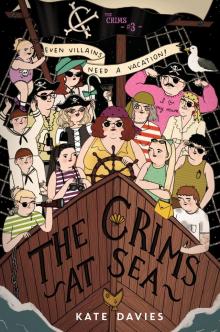 The Crims #3
The Crims #3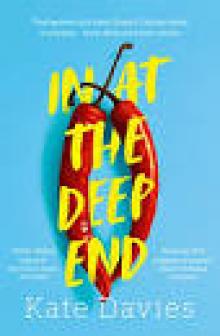 In at the Deep End
In at the Deep End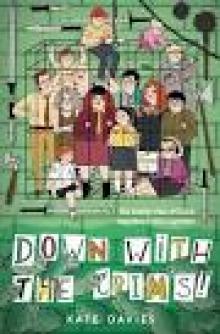 The Crims #2
The Crims #2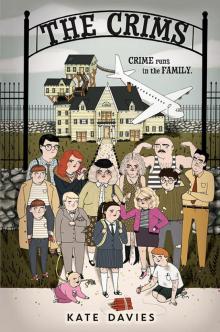 The Crims
The Crims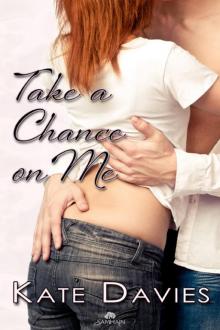 Take a Chance on Me: Lessons, Book 4
Take a Chance on Me: Lessons, Book 4